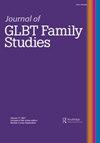South African LGBTPQ Youth: The Perceptions and Realities of Coming out and Parental Reactions
IF 2
Q2 FAMILY STUDIES
引用次数: 3
Abstract
Abstract The study engages with several lesbian, gay, bisexual, transgender, pansexual and queer (LGBTPQ) identifying youth in South Africa to explore their perceptions and realities regarding coming out to their parents and parental reactions. In-depth interviews were utilized to engage with the 17 participants, aged 19 to 32 years old, all of whom were students at the same university in South Africa. The study found that participants who have not come out tended to view coming out as a problematic act that reproduces the heteronormative discourse of sexuality in which heterosexuality is normalized, while same-sex sexuality is seen as odd and as deviant. The study also found that many participants perceived coming out as an individual choice. However, the choice of whether or not to come out, when to come out, and which parent to come out to, is dependent on 1. the nature of the relationship the participants have with their parents, and 2. perceived parental reactions. Analysis reveals how religion, gender norms based on heteronormativity, and parent-child relationship dynamics intersect to shape participants’ perceptions regarding parental reactions. This intersectionality also shaped the realities of coming out. Such realities involved a variety of reactions from parents, including acceptance, rejection, forms of violence, and silence. Parents reacting with silence was a common, yet complex experience among the participants. The participants’ experiences suggest ways through which they could be empowered to cope better with their parents’ silence and other non-supportive reactions.南非LGBTPQ青年:出柜的感受和现实以及父母的反应
摘要这项研究涉及南非的几名女同性恋、男同性恋、双性恋、跨性别者、泛性恋和酷儿(LGBTPQ)青年,以探索他们对向父母表白的看法和现实以及父母的反应。对年龄在19至32岁之间的17名参与者进行了深度访谈 他们都是南非同一所大学的学生。研究发现,没有出柜的参与者倾向于将出柜视为一种有问题的行为,这种行为再现了异性恋被正常化的非规范性话语,而同性性行为被视为奇怪和离经叛道。研究还发现,许多参与者认为出柜是个人的选择。然而,是否出柜、何时出柜以及向哪位父母出柜的选择取决于1。参与者与父母之间关系的性质,以及2。感知到的父母反应。分析揭示了宗教、基于非规范性的性别规范和亲子关系动态是如何交叉影响参与者对父母反应的看法的。这种交叉性也塑造了出柜的现实。这种现实涉及父母的各种反应,包括接受、拒绝、暴力形式和沉默。家长沉默的反应在参与者中是一种常见但复杂的经历。参与者的经历表明,通过这些方式,他们可以更好地应对父母的沉默和其他非支持性反应。
本文章由计算机程序翻译,如有差异,请以英文原文为准。
求助全文
约1分钟内获得全文
求助全文
来源期刊

JOURNAL OF GLBT FAMILY STUDIES
FAMILY STUDIES-
CiteScore
3.90
自引率
0.00%
发文量
0
期刊介绍:
The Journal of GLBT Family Studies is a much-needed resource on the working dynamics of the diverse family structures found in every corner of the world. This groundbreaking new journal addresses the vital issues facing gay, lesbian, bisexual, and transgender individuals and their families. Edited by Dr. Jerry J. Bigner, who has provided expert witness testimony in legal cases and in the litigation involving same-sex marriages in Canada, the journal features interdisciplinary studies and scholarly essays on topics related to GLBT family life and functioning as well as relationships with other families.
 求助内容:
求助内容: 应助结果提醒方式:
应助结果提醒方式:


